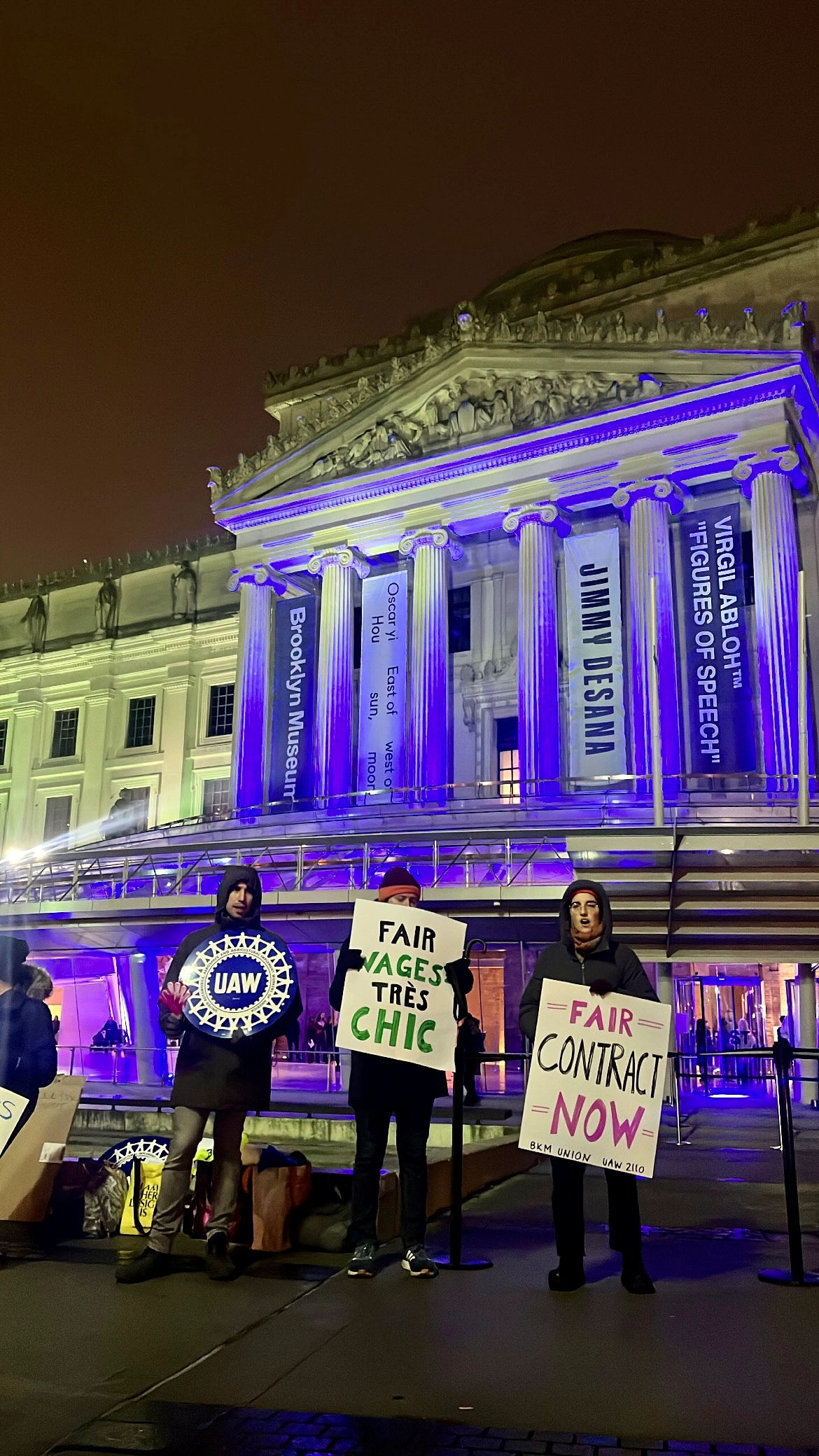
Tessa Solomon/ARTnews
Last night, while invited guests of the Brooklyn Museum viewed its new Thierry Mugler exhibition, unionized workers of the institution rallied outside its main entrance on Eastern Parkway to call attention to contract negotiations that had stalled between the union and museum leadership.
A cold drizzle graduated to a downpour as museum employees and their supporters lined the museum entryway, brandishing signs (“Fair Wages are So Chic!”)and chanting “ancient art, not ancient wages” and “overworked and underpaid.” The two-hour rally was timed to the VIP gala for the museum’s buzzy survey of the French couture designer, and its dapperly-dressed attendees, including celebrities like Kylie Jenner, Lourdes Leon, and Laverne Cox, sidestepped the demonstration by slinking through side entrances.
“This is a good way to connect with our ‘VIPS,’ the people here for that first look,” Carmen Hermo, an associate curator of feminist art who has worked at the museum for six years, told ARTnews. “We want to give them a good look at the people who put these wonderful exhibitions together.”
In August 2021,130 employees of the Brooklyn Museum, including full-time and part-time workers from the conservation, education, and visitor service departments, voted to join United Auto Workers (UAW) Local 2110. Contract negotiations with museum leadership began in January of this year, but soon stalled on issues of healthcare benefits, job security, and wages. According to a union press release, employees have not received a wage increase since 2020.
“Costs are rising, rents are ridiculous, and it’s not happening in a vacuum,” said Hermo. “We’ve learned how precarious our lives are, so healthcare is a human right and the Brooklyn museum should be offering it to all its employees.”
In September, unionized employees held a rally during an after-hours event that celebrated the opening of the museum’s revamped Asian and Islamic art galleries.The rally was a day after the union announced that they had filed an Unfair Labor Practices charge against the museum with the National Board of Labor Relations, alleging that museum leadership had engaged in unfair negotiation tactics.
A statement posted on the union’s Instagram page prior to the rally said that the museum is “reducing union positions and creating higher paid positions that it refuses to include” in the union. The statement continued, “These are obvious attempts to undercut our bargaining power and weaken our union.”
The museum has reportedly offered a 3 percent wage increase that would be effective only if the union accepts the museum’s offer in full.
“Under the Museum’s offer, increases for 2023 and 2024 would be even less—just 1.5 percent each year. The Museum cites its proposal for one-time pay adjustments for some employees, but these will apply to less than half the Union membership,” according to press release from the union released on November 14.
The union is asking for a minimum of a 7 percent increase retroactive to July 1, 2022, with 4 percent increases in 2023 and again in 2024. The union also seeks permanent positions and 25-minimum hourly rates for visitor services and retail staff who currently earn $16–$17 per hour.
A spokesperson for the Brooklyn Museum told ARTnews: “We remain committed to partnering with our staff to achieve an agreement that advances our commitments to wage equity. We respect the rights of our staff to collectively bargain and peacefully protest. We are optimistic and focused on reaching an agreement with UAW Local 2110.”
Brooklyn Museum employees are repped by UAW, which represents many major cultural institutions in the Northeastern United States, including the New Museum, the Jewish Museum, the Museum of Fine Arts Boston, and Mass MoCA. Brooklyn Museum staff joined the nationwide unionization movement in 2020 when management, citing revenue losses due to the COVID-19 shutdown, laid off 24 workers.
“We’re protesting to make it known what is happening at the bargaining table, that we’re not seeing the same emphasis on equity that the museum presents to the public,” said Owen O’Brien, manager of individual giving and campaigns in the museum’s development office. He said he’s optimistic that the union members, some of whom proudly display UAW posters at their desks, will reach a fair agreement with the museum.
“No one’s feeling worn down by this process,” he said. “We’re ready to come out here again, to do what it takes.”


